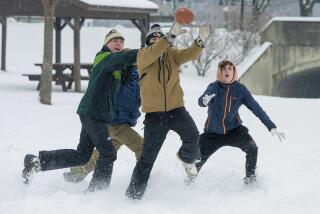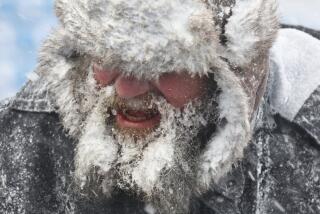Firms Greet Warm Winter With a Very Cold Shoulder
- Share via
WAUSAU, Wis. — A most unwelcome thaw in the nation’s northern snow belt has put the world’s largest weenie roast on ice. Snowmobiles are silent. Ski trails are slush and mud.
The casualties of all the warm weather include North America’s largest cross-county ski race and an ice fishing derby in International Falls, Minn., dubbed the “Nation’s Icebox” for its bitter winters.
“It is just depressing,” complained Toni White as the thermometer climbed Thursday to 45 degrees in Cable, at the northern tip of Wisconsin. She had intended to roast hot dogs at Saturday’s Winter Weenie Weekend, billed as the world’s largest hot dog roast.
The event was canceled because the venue, usually frozen Lake Namakagon, was rapidly melting.
The region, normally in a deep freeze during this time of year, has been downright balmy in recent days. A landscape white with snow two weeks ago is now barren, brown ground after days of temperatures in the 40s and 50s. There is concern that alfalfa crops and spring flowers could bloom early and then die if severe cold returns.
The thaw extends as far east as Rochester, N.Y. Even after more than 7 1/2 feet of snow this winter, towering snowbanks that once seemed tougher than granite have melted away. Farther south, Madison had its highest February temperature ever recorded this year--64 degrees on Feb. 25.
Ed O’Lenic, a meteorologist with the U.S. Weather Service’s Climate Prediction Center in Camp Springs, Md., said this winter has been warmer all over the country and around the globe.
“We did predict a warm winter this year, but what we have seen far exceeded anybody’s expectations,” he said.
For example, the average of the high and low temperatures in Green Bay for December through February is normally around 17 degrees. This winter, the average was 4 degrees warmer.
The explanation in North America is simple: Cold air from the North has not dipped into the United States with its normal frequency, he said.
There also are La Nina conditions, a phenomenon that has to do with cooler than normal temperatures in the eastern and central Pacific Ocean, which affects the jet stream, he said.
“It has got everybody’s attention, believe me,” O’Lenic said. “We are trying to sort out what the physical cause for this is. We don’t know yet. You certainly can’t blame all of this on global warming.”
The warmth has certainly brought change.
International Falls canceled this weekend’s Rainy Lake Sportfishing Club’s ice fishing derby because ice on the lake was unsafe. Michigan City, Ind., could lose up to $250,000 in rental fees because some access ramps to Lake Michigan are unusable: The shoreline has receded because of the unusually warm, dry winter.
In Michigan, “we haven’t seen a snowmobile since [Feb. 21]. Only on trailers,” said Lauri Taylor, who works at Gordy’s Place in Fife Lake, which serves up to 1,000 snowmobilers on a good weekend.
Cable typically has 2 feet of snow on the ground this time of year, but there was almost none Thursday.
“It’s another sad winter for us,” said Marcia Magee, administrative assistant for the Cable Area Chamber of Commerce. “I have had mountain bikers call and say I want to come up and ride already. It is just strange.”
At Lake Namakagon, 10 miles east of Cable and the site of the canceled weenie roast, Lakewoods Resort manager Barbara Popelka said so much ice has melted that the shoreline is water.
“We are thinking golf now,” she said, laughing.
More to Read
Sign up for The Wild
We’ll help you find the best places to hike, bike and run, as well as the perfect silent spots for meditation and yoga.
You may occasionally receive promotional content from the Los Angeles Times.






